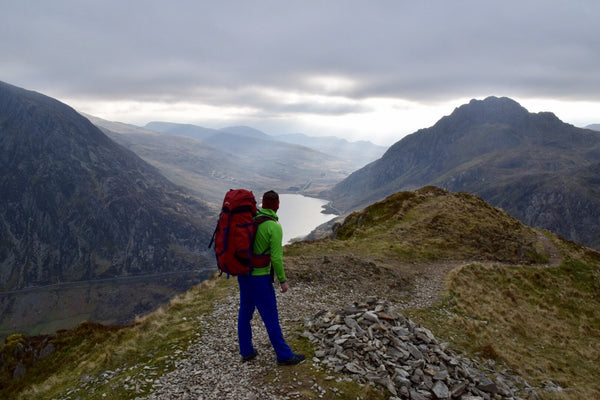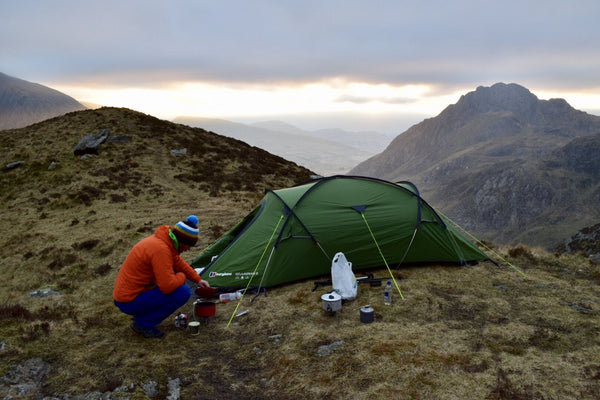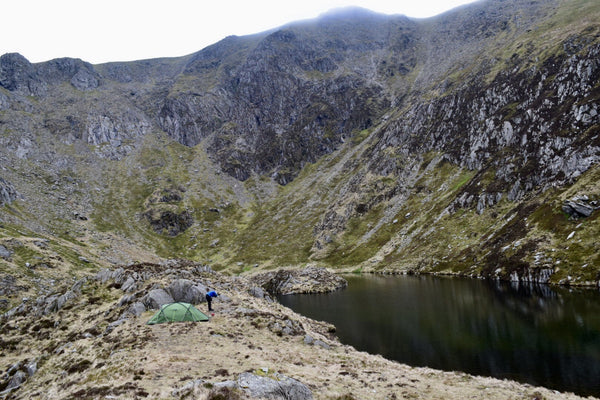
Walking and hiking in the great outdoors is a truly liberating experience. Free from the confines of your 9-5, you’re able to breathe in and absorb the beauty of your surroundings.
However, for those of you ready to take the next step, backpacking will offer an even greater sense of freedom. If you're new to backpacking there really is nothing to fear. By following our top tips and gear essentials you'll be on your very own adventure before you know it.
Backpacking is simply the practice of carrying your worldly essentials around with you as you make your way from place to place. This may sound tough, labourious even, but the rewards are huge.
Able to sustain yourself with food and shelter, you’re free to move at your own pace and decide your own destination. There is very little else that brings you closer to nature and the natural environment. So, if you’re ready to really immerse yourself in the great outdoors, read on...
Backpacking Essentials
Whenever you head into isolated areas, you should always go prepared. You may not appreciate the importance of some of these backpacking essentials until you are in desperate need of one of them.
Consequently, when you’re packing to go, lay all of the items out and tick them off using a checklist such as this before you neatly arrange them in your pack in the ever-entertaining game of backpack Tetris. That way you can avoid leaving behind something that could make or break your trip.
We’ve broken this backpacking essentials list down into three areas to further help you organise your gear. As always, there are things that you might want to add, but just bear in mind that your legs and back will thank you for travelling as light as possible.
Safety
• Map
• Compass
• Whistle
• Head torch (complete with extra batteries)
• Knife or multi-tool
• First aid kit
• Water bottles/hydration pack
• Water filter or treatment (tablets/drops etc.)
• Waterproof matches or lighter
• Sun cream
Clothing
• Moisture-wicking base layers (plus spares to keep you dry and sleep in)
• Hardwearing and moisture-wicking trousers or shorts
• Mid-layers to insulate, such as fleeces or insulated jackets.
• Outer shell jacket and over-trousers to protect you from rain and wind
• Gloves
• Hat or cap to protect you from the sun
• Woolly hat
• Hiking boots
• Hiking socks (plus spares)
Equipment
• Backpack
• Backpack rain cover
• Tent or bivvy bag
• Sleeping bag
• Sleeping mat
• Stove
• Fuel
• Pan plus grabber
• Food
• Utensils
• Cup
• Nylon cord (to hang wet clothes etc.)
Our Top Backpacking Tips

Share the experience (and the weight!)
Our first of our backpacking tips would be to find a like-minded soul to go with you. This isn’t just to satisfy your need for conversation, although having a backpacking buddy does allow you to share experiences and memorable moments with a friend. It’s also a really practical tip as you’ll be able to divide much of your heaviest gear between you.
For instance, a two-person tent is only marginally heavier than its one-person equivalent. Therefore, by sharing a two-person tent, you can split the contents of that tent between two bags, almost halving your load as a result.
As I often camp in mountainous areas, I personally don’t opt for an ultra lightweight backpacking tent, so my two-person mountain tent weighs in at a hefty 4.5kg. Being able to halve that is a real bonus when I’m slowly ascending a mountain!
Plan your route carefully
If this is your first foray into the world of backpacking, the next of our backpacking tips is to choose a well established trail.
Trails like the Offa’s Dyke offer easily identifiable paths and regular waymarks that will reduce your need to constantly navigate by map. Established trails will also regularly pass through busier areas, so help and escape routes are never too far away.
You’ll need to think carefully about how much distance you’ll be aiming to cover each day. Whatever you can comfortably walk in a normal day or period of time will need to be reduced to account for the extra weight you’ll be shouldering around.
Start off with short, flat sections and build yourself up. I also know that, personally, I can cover far more distance when I’m backpacking and wild camping with a mate than I can when we have the kids out with us. So, account for the make-up of your group and always plan your walking lengths and durations around the weakest member.
When planning your route you will also want to consider whether you’ll be doing a circular hike or a point-to-point/thru-hike. Both are very achievable, but the latter will obviously require you to have transport available at both ends so may complicate matters.
If you aim to arrive and leave by train, select a trail with a close proximity to a station. The last thing you want to do is waste hours and energy walking from a station to a trail that is a few miles away.
Tips for Camping
So, you’ve followed our backpacking tips and have acquired all of your necessary backpacking essentials. You’re almost ready! The last thing we’ll share, to help you on your way, is some top tips for camping.
We love camping! However, if your only experience of camping up to this point has been on busy car-camping sites where noisy nylon walls are only a matter of metres away from each other; you’re in for a treat. Campsites located along established trails tend to be far less commercial and, therefore, far more peaceful.
If you are using designated campsites, the only thing you really need to worry about is the distance between them on the trail. However, if you are wild camping you’ll need to consider a few more things.

The first of our tips for camping is to make yourself aware of the laws and regulations on wild camping. In Wales, where I live, there is no open access policy, meaning that you are advised to seek the permission of the landowner first. In isolated mountain areas this is not always practical.
As such, wild camping is often tolerated if you are in an isolated location, above a fence line and well out of site of buildings or roads. However, it’s really important that you leave absolutely no trace. These wild areas are habitats to endless plants and animals that deserve our respect and support.
The other thing you’ll need access to is water. Unless you plan to adopt the physical characteristics of a camel and weigh yourself down by carrying enough for your entire duration, you’ll need a water source.
Aim for fast flowing sources such as rivers and streams. However, a combination of a good water filter (or treatment) and boiling it will ensure that any impurities will soon be managed successfully.
Backpacking really is an amazing experience. By following these tips you can be sure that your first memory will be a great one.

